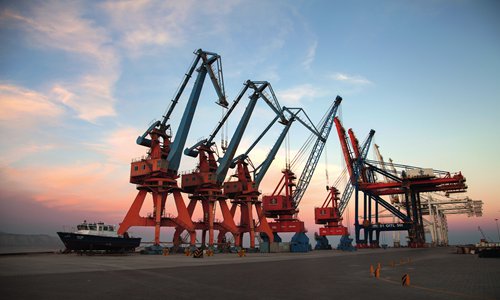HOME >> BUSINESS
Washington in no position to point fingers at CPEC
By Wang Jiamei Source:Global Times Published: 2019/11/26 20:04:31

The Gwadar port in 2017 File photo: VCG
Pakistani officials have successively come forward to refute recent US criticism of the China Pakistan Economic Corridor (CPEC). Why don't Pakistani officials buy allegations of the CPEC's "heavy debt burden?" Because they know that the US doesn't really care about their country's debt problems and that Washington is just trying to create obstacles for China-Pakistan cooperation.Moreover, according to Pakistan's Planning Minister Asad Umar, CPEC projects have added $4.9 billion in foreign loans, less than 7 percent of the total debt, which underlines the blindness of the US accusation. Geng Shuang, spokesperson for China's Ministry of Foreign Affairs, said at a press conference on Monday that more than 80 percent of CPEC projects are funded by direct investment or grants from China, with less than 20 percent using Chinese loans.
Admittedly, Pakistan has a debt problem with its foreign borrowing totaling $74 billion. But growth is the only way for a country to reduce or eliminate a debt problem, and in that sense, the CPEC projects are fully in line with Pakistan's development needs.
The first phase of CPEC projects focused on infrastructure development, while the second phase is expected to concentrate on establishing special economic zones, which will support and boost Pakistan's industrialization.
The CPEC is a flagship program of the China-proposed Belt and Road Initiative (BRI). It is not the first time that the West has criticized the BRI for its debt risks, disregarding basic facts. So far, no country has fallen into any debt crisis because of engaging in BRI cooperation with China.
It's just common sense that whether a country encounters a debt crisis does not simply depend on how much it has borrowed. What really matters is whether the country can convert loans into assets that can generate effective returns and whether the loans promote the economic growth of the borrower and enhance its long-run, sustainable repayment ability. BRI cooperation is exactly the kind of investment that aims to improve the economic and trade development of countries and regions along the route through enhancing infrastructure connectivity and building industrial zones.
While some in Washington repeat clichés about debt connected with the CPEC or BRI, the US doesn't take any concrete measures to help Pakistan with its economic development. It is regrettable that Washington will never understand how much some developing countries need BRI or similar programs to modernize and lift their people out of poverty.
The author is a reporter with the Global Times. bizopinion@globaltimes.com.cn
Posted in: COLUMNISTS